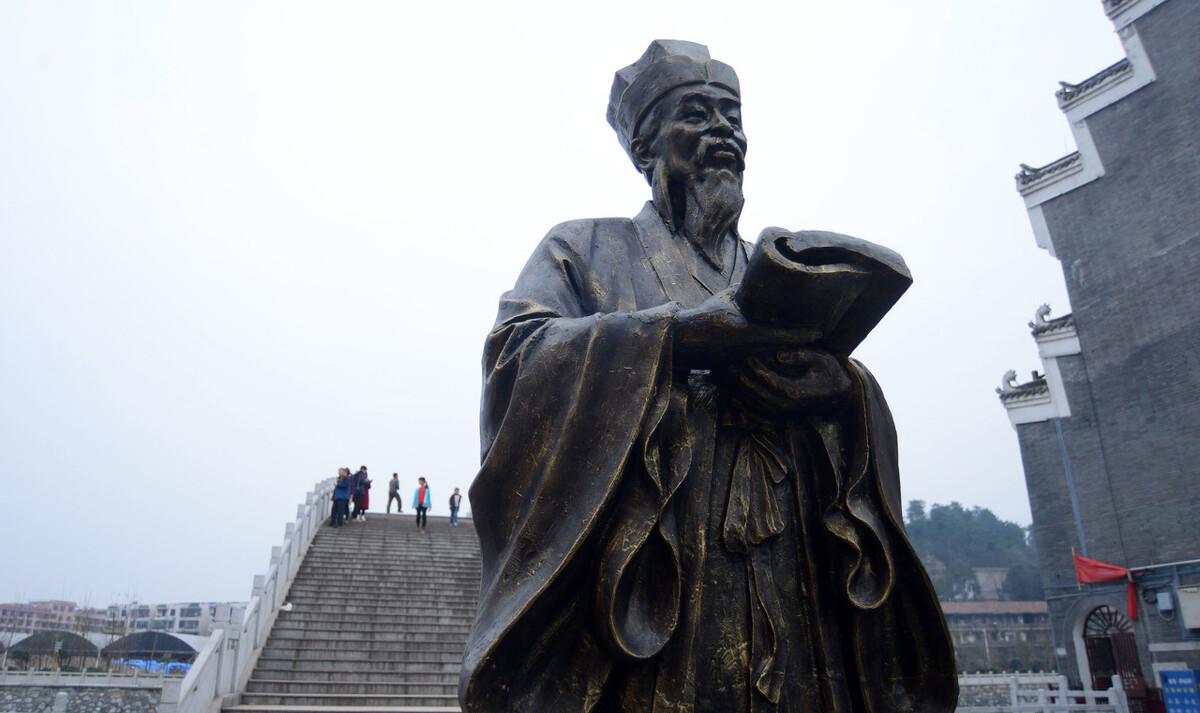Zhou Dunyi: "The Sayings of Eileen" and zen Buddhism's "Troubles are Bodhi"
"Eileen Says" is very short, with a total of only 119 words. This was written when Zhou Dunyi was 47 years old. He only lived for 57 years, and 47 years old is even middle-aged and elderly, and this work represents the maturity of his thinking.

The article said that there are three kinds of flowers in the world that represent three kinds of personality: the first is the chrysanthemum, the favorite of Tao Yuanming in the Jin Dynasty; the second is the peony, the favorite of ordinary people since the Tang Dynasty; the third is the lotus flower, which I love. Because she comes out of the mud without staining, Mao Qinglian is not demon, the heart is transparent, the appearance is upright, and it emits a faint fragrance. You can only admire her from a distance, but you can't blaspheme her. It is the hermit who loves chrysanthemums, the laymen who love peonies, and the gentlemen who love lotuses. I am a gentleman who loves lotuses. However, after all, there are many laymen and few gentlemen in this world, who wants to be the same as me, to be a gentleman who is not stained with customs and is straight from the outside?
Many people have a question: Isn't the lotus a lucky flower in Buddhism? Zhou Dunyi's love for lotus flowers is related to Buddhism? That's right.
There are many Buddhist records about lotus flowers, and there is also a sutra that is specifically named after the lotus flower, called the Lotus Sutra of the Myofa Lotus, referred to as the Lotus Sutra for short. Everyone is most familiar with the Lotus Platform of Guanyin Bodhisattva. Since ancient times, India has regarded the lotus flower, especially the red lotus, as the most noble flower in aquatic plants, and Buddhism regards it as one of the "Seven Treasures". The Vimalaya Sutra says:
For example, on the plateau land, there is no lotus flower, and the wet mud is born.
The lotus flower always grows in the muddy muddy water, and according to the Buddhist understanding, the muddy water is the trouble, and without all the troubles of the world, one cannot become a Buddha. This is called "defilement is bodhicitta," and bodhichitta is achieved in defilement. Zhou Dunyi never mentioned that he wanted to become a Buddha, he only became a gentleman, but the reasoning was the same. Zhou Dunyi himself said that his ideological realm was inspired by several monks.
There is a Zen book called "The Record of lay people's Divided Lamps", which says that Zhou Dunyi was the Buddha's heir to the Yuan Zen master, that is, a lay disciple. Zhou Dunyi also interacted with the obscure ancestral heart, Donglin Changzong, Buddha Yinyuan, Huang long Huinan and others, all of whom were famous monks at that time. According to Buddhist records, Zhou Dunyi's academic ideas were basically inspired by Zen masters. For example, Zhou Dunyi especially advocates the realization of the "joy of Kong Yan", which originates from the obscure ancestral Zen master's "dotting in his own house". Zhou Dunyi played the "way of sincerity" of Confucianism, that is, it originated from Donglin Changzong's "practical reasoning, not a dust". Zhou Dunyi's original "Taiji Tushu" is derived from the "Legal Circle" theory of the Huayan Jing. Zhou Dunyi himself also admitted that Huang Long Huinan and Buddha Yinyuan inspired his "wonderful heart", and Donglin Changzong gave him a thorough grasp of the "Yi" theory.
You may not believe in The Buddhist account. However, the "Testament of Ercheng" records a sentence that Ercheng said:
Uncle Zhou Mao, poor Zen guest.
Zhou Maoshu is the word for Zhou Dunyi. Students say that their teachers are "poor Zen guests", which is inexplicable. Some people interpret this sentence as: "Zhou Dunyi once argued with a Zen master, and said that the Zen master was poor in words. "How is that possible. It was normal for Zhou Dunyi to be influenced by senior monks. He "does not remove the grass in front of the window", and when asked why, he replied that it was "the same as his own meaning". This allusion Zhu Xi once mentioned shows that Zhou Dunyi learned the essence of Zen Buddhism and lived a lively and free life.
Some people say that there are lotus flowers everywhere in Hunan and Jiangxi, and Zhou Dunyi's writing of "The Saying of Loving Lotuses" may not be related to Buddhism. The problem is, you just sit in the water every day and look at the lotus, can you see what it is? Zhou Dunyi discovered the beauty of the lotus flower, which was the result of his near-perfection of spirit. Chinese regard peony as the national flower, and Indians regard the lotus flower as the national flower, one pursuing wealth and the other pursuing holiness. This is the difference between the two cultures. In China, Zhou Dunyi, who appreciates lotus flowers and says that lotus flowers are so noble, is probably the first person. Zhou Dunyi's "The Story of Eileen" shows that his spiritual temperament is extraordinary, and it is extremely difficult for ordinary Confucians to reach his realm.
The bosom spills out like light and moon.
The free mind, like the clear and clean after the rain and the sun, shows zhou Dunyi's outstanding character. Note that true Taoists attain the realm of sages by practicing what they preach, and this is also the meaning of Wang Yangming's later emphasis on "the unity of knowledge and action." If you can't do it and want to sell your reputation, you are a false Taoist, a hypocrite.